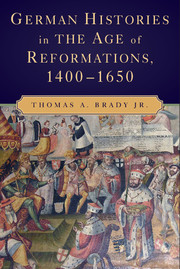Book contents
- Frontmatter
- Contents
- Figures, Maps, and Tables
- Acknowledgments
- A Note on Usages
- Map 1 The Empire in 1547
- Map 2 The Peace of Westphalia, 1648
- Part I The Empire, the German Lands, and Their Peoples
- Part II Reform of the Empire and the Church, 1400–1520
- Part III Church, Reformations, and Empire, 1520–1576
- Part IV Confessions, Empire, and War, 1576–1650
- Appendix
- Glossary
- Bibliography
- Index
Part III - Church, Reformations, and Empire, 1520–1576
Published online by Cambridge University Press: 05 June 2012
- Frontmatter
- Contents
- Figures, Maps, and Tables
- Acknowledgments
- A Note on Usages
- Map 1 The Empire in 1547
- Map 2 The Peace of Westphalia, 1648
- Part I The Empire, the German Lands, and Their Peoples
- Part II Reform of the Empire and the Church, 1400–1520
- Part III Church, Reformations, and Empire, 1520–1576
- Part IV Confessions, Empire, and War, 1576–1650
- Appendix
- Glossary
- Bibliography
- Index
Summary
Religions are kept alive by heresies, which are really sudden explosions of faith. Dead religions do not produce them.
Gerald BrenanThe reform of the Church and religious life presented the greatest leftover problem associated with Western Christendom's recovery from the fourteenth-century crisis and depression. It is neither coincidental nor merely interesting that the most luxuriously creative set of solutions should have appeared in the Holy Roman Empire. Of all the major kingdoms of Western Christendom, the Empire had experienced in the previous 100 years the least successful attempts at reform of the Church and religious life. Of all the sixteenth-century reformations, it proved easily the most tumultuous, most varied, most creative, and, therefore, least decisive. For these reasons, the Protestant reformation forms the obvious, even unavoidable, centerpiece of any account of the German lands in this epoch. Some have called it the dawn of Europe's modernity, others a failed German national revolution. About its causes, too, there is no consensus. Did it happen because of Luther's unique personality, the corruption of the Church, the formation of nation-states, or the rise of the middle classes? Each explanation founders on the reefs of the known facts or on the shoals of ignorance. We do not even know whether the Protestant reformers attacked a Church fallen from the higher standards of medieval (not to mention ancient) times; whether a more devout laity was placing higher expectations on its clergy who could not fulfill them; or whether (some) Christian people revolted against the old Church because it burdened their consciences, their pocketbooks, or both.
- Type
- Chapter
- Information
- German Histories in the Age of Reformations, 1400–1650 , pp. 157 - 160Publisher: Cambridge University PressPrint publication year: 2009



